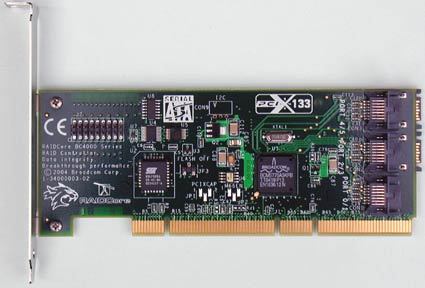Multi-channel RAID for SATA: 3Ware, Highpoint and Raidcore/Broadcom
Raidcore/Broadcom BC4000 Series
After the Fulcrum software architecture from Raidcore caused a stir at the end of last year - a SATA controller offers the same functional range as the best SCSI models - chipmaker Broadcom has bought Raidcore .
As a result, since June, all Raidcore controllers have been based on Broadcom's own BCM5770 chip, including the BC4852 that arrived at our office for the test. The card is supplied with a PCI-X interface working at up to 133 MHz. This is important in the context of what is known as the controller voltage, because Raidcore is the only company to date to support the creation of an array spanning a maximum of four controllers. We tried this feature out, because 3Ware's main competitor does after all also offer 12 ports. All the benchmark results with Raidcore and 12 drives are thus based on the use of two BC4852 controllers.
There are also useful features such as online capacity expansion, online RAID-level migration, drive roaming for plugging drives into any of the ports, global, distributed or dedicated spares plus various arrays for each drive. This means it is possible to run two different arrays on one and the same drive set, or even just overlap individual drives. Intel offers something similar with the 925/915 chipsets and the ICH6R-southbridge: MatrixRAID uses two drives to create an insecure RAID 0 plus an additional, mirrored RAID 1. However, Raidcore offers this functionality to perfection with the BC4000 Series.
| Broadcom Raidcore BC4000 Series | |
|---|---|
| Models | BC4852 (8-channel SATA)BC4452 (4-channel SATA) |
| RAID | Missing RAID levels: 1n, 10nRAID is not in hardware |
| Interface | 133 MHz |
| Maximum array size | 3 TB |
| Cache memory | No cache memory on board |
| Features | Background initializatione-mail notificationOnline capacity expansion, online RAID levlel migrationMultiple card support (max. 4)Multiple array & Volume supportTime-delay spin-up for drives |
Get Tom's Hardware's best news and in-depth reviews, straight to your inbox.
Current page: Raidcore/Broadcom BC4000 Series
Prev Page Highpoint RocketRAID 1820A, Continued Next Page Raidcore/Broadcom BC4000 Series, Continued
Patrick Schmid was the editor-in-chief for Tom's Hardware from 2005 to 2006. He wrote numerous articles on a wide range of hardware topics, including storage, CPUs, and system builds.
